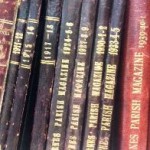Follow the drum: The first winter of the war

The latest post from our Follow The Drum series documenting life in the borough during World War I. This month the first winter of the war: appeals in Barnes and the fortunes of a Mortlake man.
We get a sense of how harsh conditions were at the Front and of how worried local families were about their men serving in the forces due to the cold winter conditions through reading archive material such as ‘Barnes Parish Monthly Magazine’.
In the October 1914 edition the Rector, the Reverend B. Meredyth Kitson, wrote about an appeal for blankets which were to be used at the Front by the soldiers of Kitchener’s Army. It had been highly successful as the total number of blankets sent in to the Rectory amounted to about 300. These items were then sent off to Aldershot for despatch to the men. The Rector described this as ‘A splendid response!’. He offered thanks to the ‘kind friends’ who made this considerate gesture as the cold winter nights approached for the troops out in the open trenches.
Everyone who made such a donation was listed in the Parish Magazine with the number of blankets next to their name. The Rector himself provided 4 blankets for the appeal, the Churchwarden 2. Significantly there were only two other men listed as blanket donors on the published list, all other names were women and this is another indication of the impact of recruitment campaigns for volunteers to join up at this time.
The local population also responded to national appeals during this period. There had been an appeal for socks and belts for the troops which was endorsed by the Queen and according to the Richmond & Twickenham Times (24th October 1914) these items were sent to Devonshire House from Twickenham. The biggest contribution came from the teachers of the girls and infants departments at St Mary’s School. It was largely the children’s work that they sent: 100 pairs of socks ‘capitally made … chiefly the work of the children’. The teachers supplied the material for this project: ‘…it was a very happy thought on the part of the school staff and one that all will appreciate’. The newspaper also published a list of all the teachers who supported this endeavour.
Appeals for clothing and home comforts for the troops continued and were much publicised in the local newspapers. At this time there were 3 Surrey Battalions abroad so the Lord Lieutenant of the county wrote to the Surrey Needlework Club urging them to assist on a monthly basis. This letter also mentions the plight of women who were out of work due to the war, suggesting that this could be a way to earn a living. (Richmond Herald, 7th November 1914). From the ‘Firing Line’ the men themselves also requested comforts such as tobacco: ‘I have just received your very welcome parcel, and am very lucky to be alive to get it, thank God…It was very good of that lady to buy the socks… only send a git of tobacco for that is the greatest comfort that we have…’ (letter from Private W. Hutt, 1st Grenadier Guards, late in the employ of Messrs. Hornby of Richmond in the Richmond Herald 7th November 1914).
The impact of the war at sea was also directly felt by a local man, Private Herbert Graves of the R. M. I. (previously employed by the Mortlake Brewery but called up as a reservist at the outbreak of the war). Early in November 1914 he had been mobilised and order to join the ill-fated ‘Aboukir’ but at the last minute the order was changed and he was transferred to H. M. S. Hermes. This vessel was engaged in carrying seaplanes to the Continent and was struck by torpedoes from a sub-marine in the Straits of Dover. (Richmond Herald, 7th November 1914). Unused to this new form of warfare and the small submarine periscope, Private Graves (on watch) had to rely on looking for the tell-tale froth created by the torpedo when it was discharged. ‘Hermes’ went down and he had to swim for over an hour before being picked up by a whale boat, H. M. S Lucifer. He was returned to Chatham within 12 hours of the start of the attack. Private Graves had been entrusted with the ship’s key as part of his responsibilities as captain’s orderly and hoped to be able to pass it on as an heirloom.
There are many other fascinating stories about this stage of the war and its effect on life in the Borough in archive material held by the Richmond upon Thames Local Studies Library & Archive.
